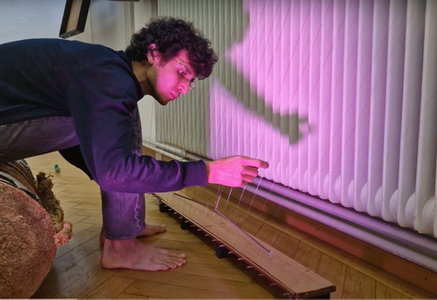Mehdi Hesamizadeh | Composer, Violist, Sound Artist
the Place
The workshop will take place in Tumanyan, a small town in the mountains of northern Armenia, set in the gorge of the Debed River. This place has a rich soundscape: echoes from the cliffs, flowing water and passing trains, shifting winds, birdsong, herding calls, and jackals howling at dusk. Tumanyan brings together the beauty of nature with the layered traces of its industrial past, where the silence of derelict factory structures rings in contrast to the gentle rhythms and familiar sounds of peaceful village life. As we create our musical objects, we will explore this environment, drawing inspiration from its sounds, materials, and stories.
The wood workshop where the sessions will be held is housed in an old village house with a lush garden and beautiful views of the gorge.
Instructors

Mehdi Hesamizadeh
portfolio
My approach to making instruments involves experimenting with alternative tuning systems, repurposing discarded instruments and exploring non-standard forms. When I design an instrument, I begin with a desire to craft a voice through material. The process often involves working with repurposed parts, recycled elements, or shaping raw materials to give new life to both the object and the sound it produces.
I see instrument design as a dialogue between material, sound and philosophy. The tuning and form of an instrument are intertwined with human experience and language, the body, communication and nature.
The whole process of making is an extension of composition. I learn tuning systems and explore new forms, always considering both the physical shape and the sound it's meant to make. Each instrument I make has its own reason for being – whether it follows traditional standards or arrives at them by accident.

Andrei Terentev
portfolio
The intention of making sound objects is based on the will to search for the sound that can resonate with the inner world and express it to the outside. Traditional western and eastern instruments often offer a variety of scales, but lack variety of voices or mobility. With the help of modern technologies it is possible to create almost any desired sound, but it is stuck in the ecosystem and has a huge disadvantage in the lack of material, medium. When the player comes into direct contact with an unusual instrument, (s)he tries to explore all the possibilities it offers, instead of playing scales, notes; the player plays with the instrument, plays on the instrument, finds unusual ways to make it sound. The listener is involved in this journey, hearing this searching, finding, expressing. Because most of these instruments are played with sound rather than notes, there's a huge variety of expression and it doesn't require any skill.
About the Workshop
Over eight days of the workshop, we will embark on a shared journey from imagining musical objects to bringing them to life. The program will begin with a brief introduction to the historical contexts of instrument-making, followed by an overview of practical skills essential for working with tools and selecting materials. In addition to hands-on techniques, we will explore the more subtle dimensions of instrument-making: how personal creativity connects with language, the human body, philosophy, traditions of communication, and the natural environment, among other factors, to shape the design and tuning of an instrument. Alongside participating in group sessions, each participant will also develop an individual project with guidance from the instructors. The workshop will conclude with a public exhibition and musical event to celebrate and share our creations.
Practical Information
Dates
August 1–8, 2025
Location
Tumanyan, Armenia
In partnership with Mejlis Institute and Abastan Community
Language
English
(The ability to communicate in English is expected, but nobody will be turned away for limited language skills. If you are unsure about your English, you are still very welcome to apply! Interest and enthusiasm matter most.)
Fees
220 USD / 85,000 AMD
The fees include participation, access to workshop, and materials.
Upon confirmation of admission, participants are asked to secure their place by paying a non-refundable deposit of 100 USD / 40,000 AMD within one week of acceptance. The remaining balance is due by July 25, 2025. Payments should be made by bank transfer to the account of Abastan NGO. Payment details will be provided upon admission.
Application Deadline
July 15, 2025
Admissions are made on a rolling basis. Applicants will be interviewed, and decisions will be based on both the application and interview. Early applications are encouraged, as the workshop is limited to 10 participants.
Accommodation
The workshop fee covers participation in the program and materials. Participants are responsible for arranging their own transportation, accommodation, and meals. Admitted participants will receive advice and recommendations on travel and local accommodation options.
Contact
mehdi.hesamizadeh[at]icloud.com













